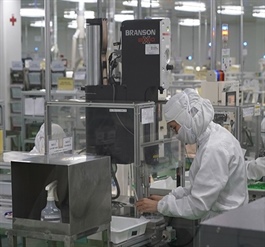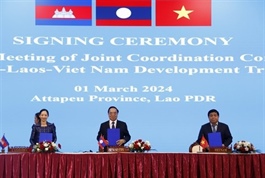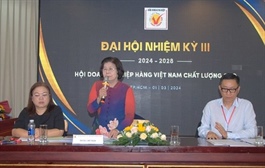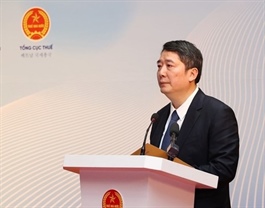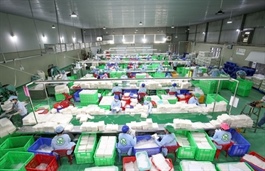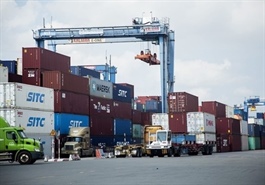Vietnam eyes measures to keep hold of big-tech firms
Vietnam eyes measures to keep hold of big-tech firms
By February 20, the total foreign direct investment (FDI) reached nearly US$4.3 billion, a 39% increase compared to the same period last year.
Infrastructure, human resources, and institutional reform are crucial breakthroughs that Vietnam needs to undertake immediately to attract and retain investors and large technology companies.
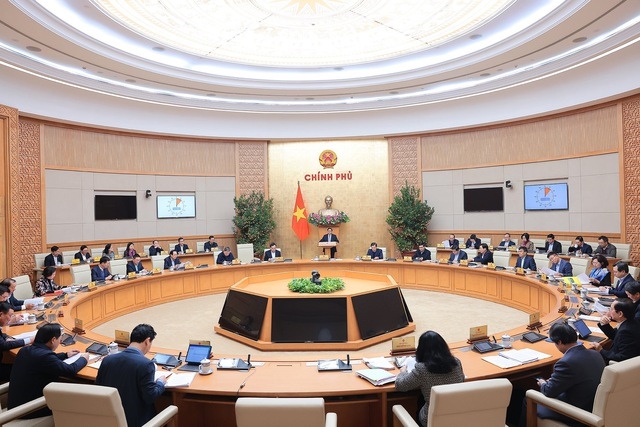
Deputy Minister of Planning and Investment Tran Quoc Phuong at the press briefing. Photos: Nhat Bac |
Deputy Minister of Planning and Investment Tran Quoc Phuong made the remarks at a government press conference today [March 2].
Phuong noted that foreign investors are very concerned about infrastructure, and have high demands on land and transportation infrastructure. Therefore, Vietnam needs to speed up the progress of major infrastructure projects currently underway, he said.
The Land Law was approved by the National Assembly in early 2024, with numerous measures to facilitate and promote investment in the land sector. Phuong believes that the implementation guidelines for this law should be issued promptly by relevant authorities to meet investors' expectations.
Another breakthrough that Vietnam needs to make immediately to retain major investors is in the area of human resources. In line with the goal of developing human resources, Vietnam aims to have 100,000 highly skilled workers, including 50,000 semiconductor engineers, to capitalize on investments in the sector.
Phuong said the Ministry of Planning and Investment and the Ministry of Education and Training are gearing up efforts to submit the plan to the government soon.
"Investors have high demands for skilled labor. While Vietnam has the advantage of abundant human resources, it is currently in a demographic dividend period and needs to focus on improving the qualifications and skills of the workforce," he said.
Finally, institutional reform is critical. Phuong noted that recent policies on land, tenders, immigration, and visas, among others, have had a positive impact on investor sentiment. However, the current institutional framework needs to introduce more comprehensive and encouraging policies, especially in emerging sectors such as high-tech and semiconductors.
"Policies need to be carefully designed to ensure the attractiveness of FDI and its optimization," noted Phuong.
According to data from the Ministry of Planning and Investment, by February 20, the total foreign direct investment (FDI) reached nearly US$4.3 billion, a 39% increase compared to the same period last year.
Newly registered capital alone doubled from the previous year, reaching $3.6 billion. According to Phuong, this is attributed to a 55% increase in the number of new projects and the large scale of investment capital ($400-600 million).
"This signals the commitment of foreign investors to Vietnam. In addition, a large increase in capital and new projects will have a positive impact on growth," Phuong said.

Overview of the Government's meeting. |
Earlier, at the monthly government meeting on the same day, Prime Minister Pham Minh Chinh instructed ministries and sectors to analyze what needs to be done to propose solutions to attract and retain reputable technology giants. He stressed that "this is a task that needs to be accomplished this year to achieve the goals of the entire five-year term [2021-2025]. “
Vietnam is increasingly attracting large technology corporations from the US, South Korea, and Japan. Many corporations like Apple, Boeing, and Google have expressed significant interest in investing in Vietnam. However, experts believed that many opportunities arising from the trend of capital relocation have not been fully utilized by Vietnam due to a lack of a high-quality workforce and and the implementation of the global minimum tax policy starting in early 2024.
Currently, the manufacturing industry is leading in attracting foreign capital, experiencing an almost 17% increase compared to the same period. In the high-tech sector, semiconductors are considered a crucial national industry for the next 30-50 years.
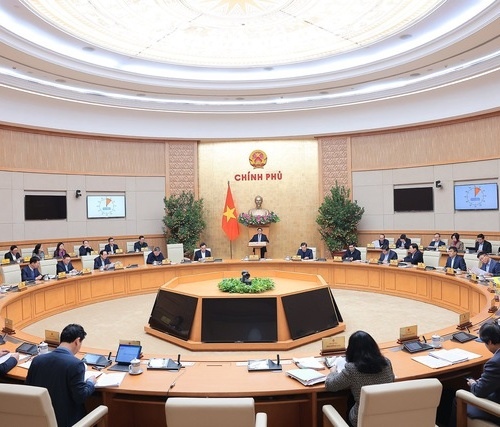
Prime Minister Pham Minh Chinh at the meeting. |
By 2030, Vietnam aims to become a semiconductor technology hub (design, packaging, and testing) according to the Government's strategy.
A report from the Ministry of Planning and Investment noted the economic transition has shown improvement in most sectors in the first two months of the year. The Consumer Price Index (CPI) in February increased by 3.98% compared to the same period, with the budget revenues reaching 23.5% of the estimate. The trade surplus exceeded $4.7 billion, the highest in the last 10 years.
Over 41,000 businesses have been reinstated or resumed operations, marking an 8.5% increase compared to the same period. However, Minister of Planning and Investment Nguyen Chi Dung pointed out that businesses still face difficulties in accessing capital, lack supportive policies, and encounter slow administrative procedures.
"Some real estate enterprises and projects still face legal obstacles that are being slowly addressed," he noted.
These challenges create pressure on managing growth, stabilizing macroeconomic conditions, and achieving significant balances in investment, consumption, and welfare this year.
Therefore, Prime Minister Pham Minh Chinh emphasized the need for ministries and sectors to propose solutions to revitalize traditional growth drivers (investment, export, consumption) and promote new growth drivers related to digital transformation, green conversion, and the sharing economy.



